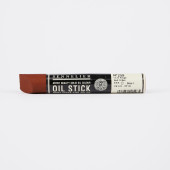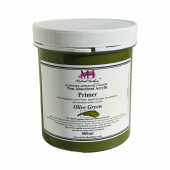Search results for 'canvas boards of oils'
-

Sennelier Oil Sticks
Starting at: £7.65
Solid artists' quality oil paint sticks. (Ø = 3/4 ; length = 5" ) SENNELIER Extra-Fine Solid Oil Sticks can be used alone or in combination with oil colours in tubes. The oil stick colours can be used for an entire painting. They are applied directly to any traditional oil-painting support, such as canvas, wood panel or fine art paper. They need the same archival priming (acrylic gesso or oil ground) that oil paint requires. Surfaces: Before use, the surface film of the oil stick must be peeled off. It will form again after a few days of non-use, protecting and conserving the colour. The oil sticks must be applied in a thin film application of no more than 1mm thick. Once applied they can be painted over with oil stick or oil paint and if desired be diluted with turpentine. Oil stick Medium, a colourless oil stick, may be used to produce transparent effects and glazes. Once applied, the oil stick surface will dry in 2 to 5 days, depending on the atmospheric conditions Varnishing: If varnishing is desired, you must wait 6 months (as in traditional oil paint) until the colour is completely dry, before giving the painting a final coat of picture varnish. Use a soft brush to varnish so that the oil stick marks are not disturbed. SENNELIER Extra-Fine Solid Oil Stick colours are either opaque (O) or transparent (T) depending on the nature of the pigment in each colour. Oil Sticks do not change during storage and require no special precautions except to be kept away from any source of heat, which could adversely affect the stick. Application Techniques After applying the colour with the point or the edge of the oil stick, colours can be mixed directly on the support using the following methods: • Blending, with brush, finger, or drawing stump. With or without turpentine • Wash-drawing, dilute colours with turpentine or mineral spirit • Retouching, with oil stick, palette knife or brush • Textures, thick application oil stick colour. Retouch with a brush or palette knife •Sgraffito, scratching a layer of fresh paint with a point (brush handle, palette knife, etc.) to reveal the layer below. Sgraffito is related to engraving, and is used not only for revealing the under-layers of paint but also to scratch and clean unsatisfactory parts of the painting •Interior Decoration, on glass, ceramics etc. Use for decorative purposes only Learn More -

Michael Harding Non Absorbent Acrylic Primer - Colours
Starting at: £21.20
Michael Harding Non-Absorbent Acrylic Primer (NAAP) is a versatile product suitable for application on various surfaces, including linen, wood, MDF, and more. It is designed to create a robust, flexible, permanent, and intensely pigmented ground, making it an excellent choice for both acrylic and oil paints. Important Application Guidelines: Support Selection: NAAP should not be applied over surfaces treated with rabbit skin/hide glue or on unsound, flimsy supports such as cardboard. Opt for stable substrates to ensure the primer’s effectiveness. Not a Gesso: Please note that NAAP is a primer, not a gesso. As such, there is no need for additional gessoes, sizes, or other ancillary products when using NAAP. DIRECTIONS: Coat Application: Apply a minimum of two coats of NAAP to your chosen support, ensuring liberal coverage for optimal results. Dilution for Flow: If you desire increased flow, dilute NAAP with a mixture of 1 part water to 4 parts NAAP. This adjustment allows for customization based on your artistic preferences. Second Coat Application: Apply the second coat once the first coat is touch dry, typically after approximately 1 hour. This step contributes to the creation of a well-prepared painting surface. Additional Considerations: Suitable Supports: Do not use Michael Harding Non-Absorbent Acrylic Primer on flimsy or unsound supports. It is crucial to choose a stable and well-prepared surface for priming to ensure the longevity and integrity of your artwork. Canvas Weave Consideration: Avoid using this primer on canvases with a wide weave. The non-absorbent nature of the primer may not be suitable for canvases with a loose or open structure, compromising its effectiveness. Transparency Check: Before application, inspect your canvas material by holding it up to the light. If you can see light passing through the wefts (threads) of the canvas, it is not recommended to use Michael Harding Non-Absorbent Acrylic Primer. Opt for a more appropriate primer based on the transparency of your canvas. Learn More -

Michael Harding Non Absorbent Acrylic Primer - Clear Transparent
Starting at: £21.20
Michael Harding Non-Absorbent Acrylic Primer (NAAP) is a versatile product suitable for application on various surfaces, including linen, wood, MDF, and more. It is designed to create a robust, flexible, permanent, and intensely pigmented ground, making it an excellent choice for both acrylic and oil paints. Important Application Guidelines: Support Selection: NAAP should not be applied over surfaces treated with rabbit skin/hide glue or on unsound, flimsy supports such as cardboard. Opt for stable substrates to ensure the primer’s effectiveness. Not a Gesso: Please note that NAAP is a primer, not a gesso. As such, there is no need for additional gessoes, sizes, or other ancillary products when using NAAP. DIRECTIONS: Coat Application: Apply a minimum of two coats of NAAP to your chosen support, ensuring liberal coverage for optimal results. Dilution for Flow: If you desire increased flow, dilute NAAP with a mixture of 1 part water to 4 parts NAAP. This adjustment allows for customization based on your artistic preferences. Second Coat Application: Apply the second coat once the first coat is touch dry, typically after approximately 1 hour. This step contributes to the creation of a well-prepared painting surface. Additional Considerations: Suitable Supports: Do not use Michael Harding Non-Absorbent Acrylic Primer on flimsy or unsound supports. It is crucial to choose a stable and well-prepared surface for priming to ensure the longevity and integrity of your artwork. Canvas Weave Consideration: Avoid using this primer on canvases with a wide weave. The non-absorbent nature of the primer may not be suitable for canvases with a loose or open structure, compromising its effectiveness. Transparency Check: Before application, inspect your canvas material by holding it up to the light. If you can see light passing through the wefts (threads) of the canvas, it is not recommended to use Michael Harding Non-Absorbent Acrylic Primer. Opt for a more appropriate primer based on the transparency of your canvas. Learn More



